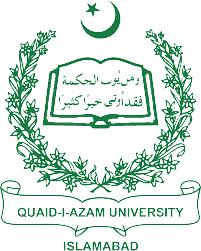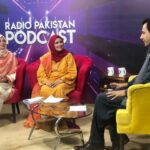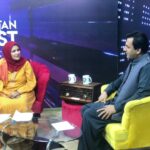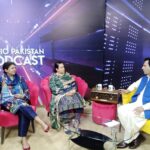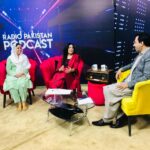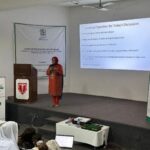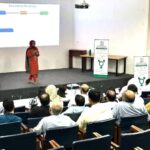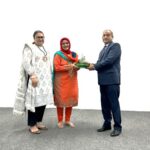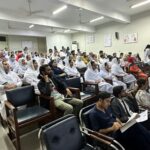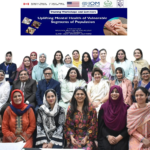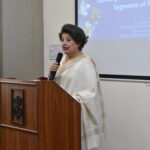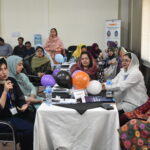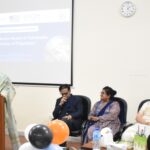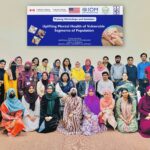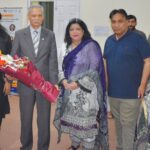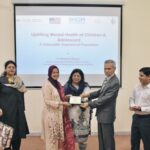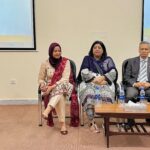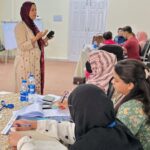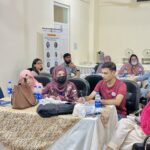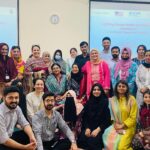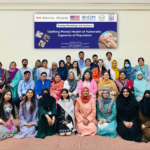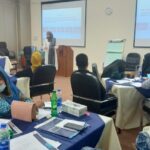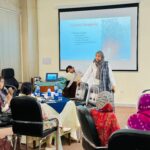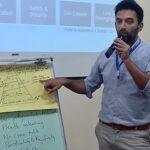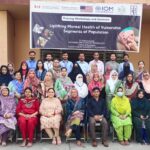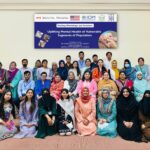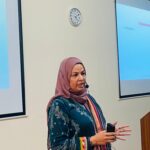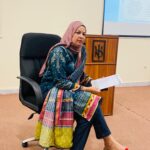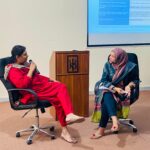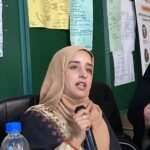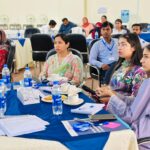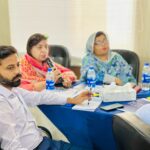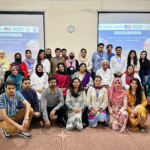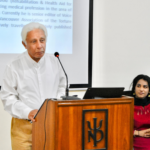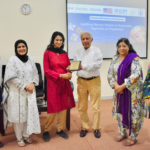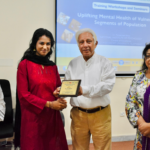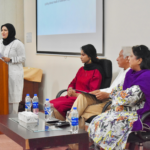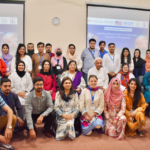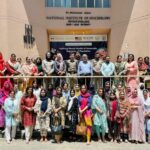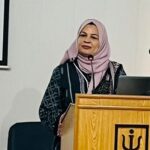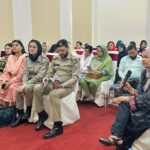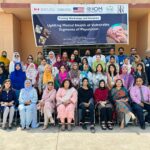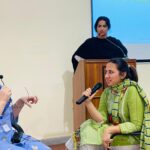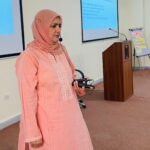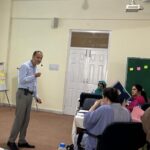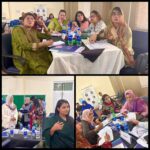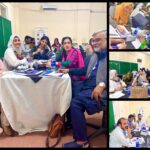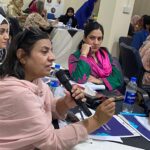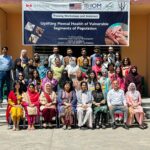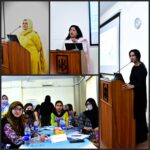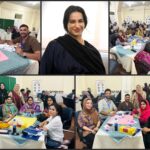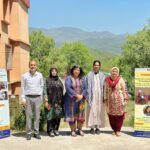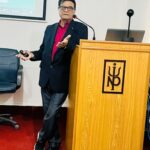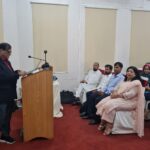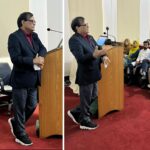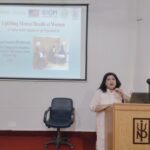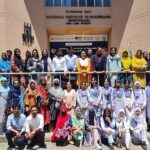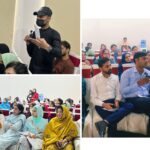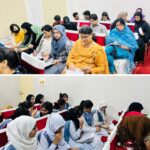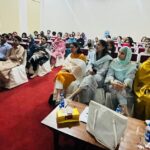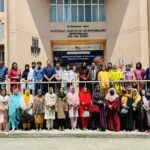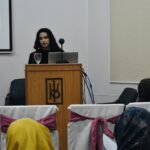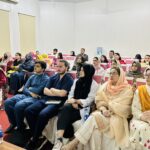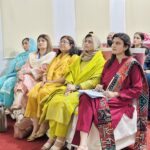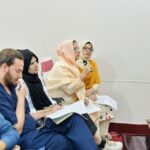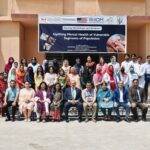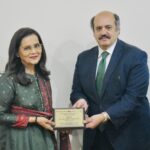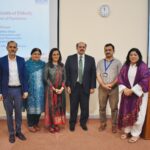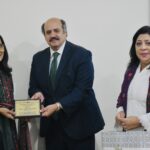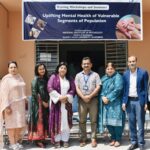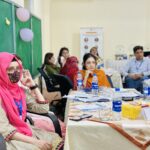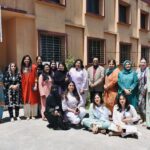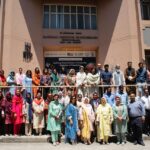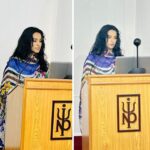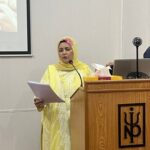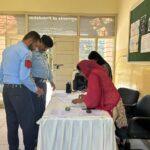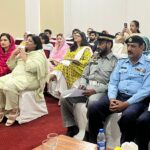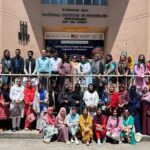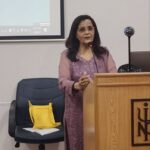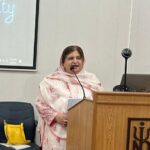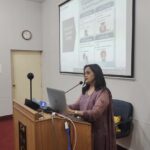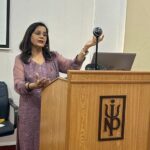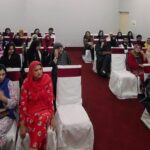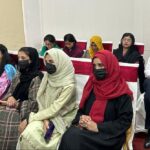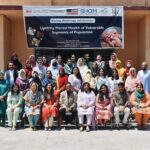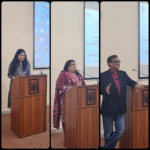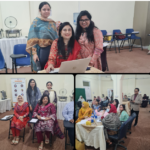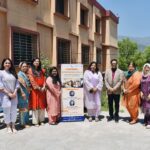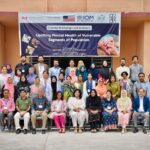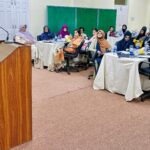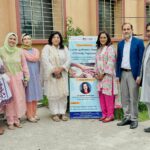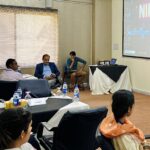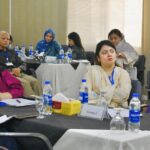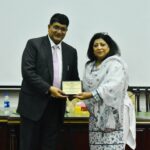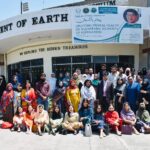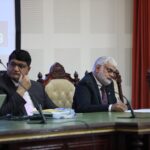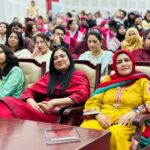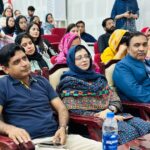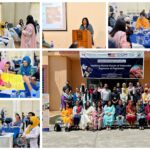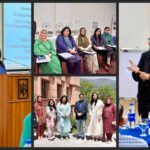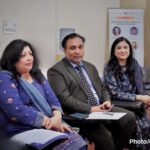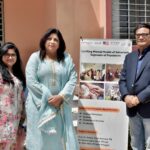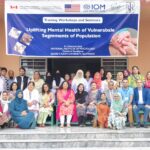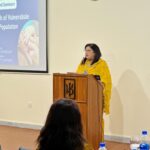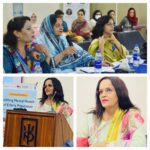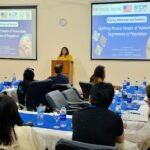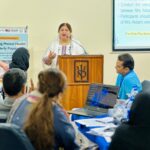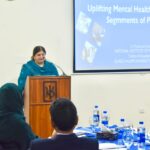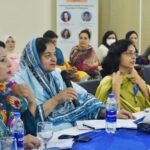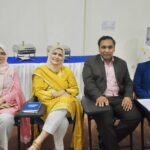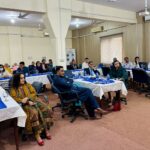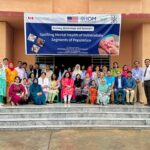NIP_IOM
Uplifting Mental Health of Vulnerable Segments of Population
International Conference
28th June 2024

Conference is going to be held as a part of Project “Uplifting Mental Health of Vulnerable Segments of Population” sponsored by International Organization of Migration (IOM). Focus is on uplifting mental health of elderly, women, children and adolescents, and socioeconomically disadvantaged people.
Conference activities included guest speeches/keynotes, panel discussions, group presentations, and poster presentations based upon following themes.
2 Days Training Workshop Schedule
Workshop Flyers




Seminars on Mental Health
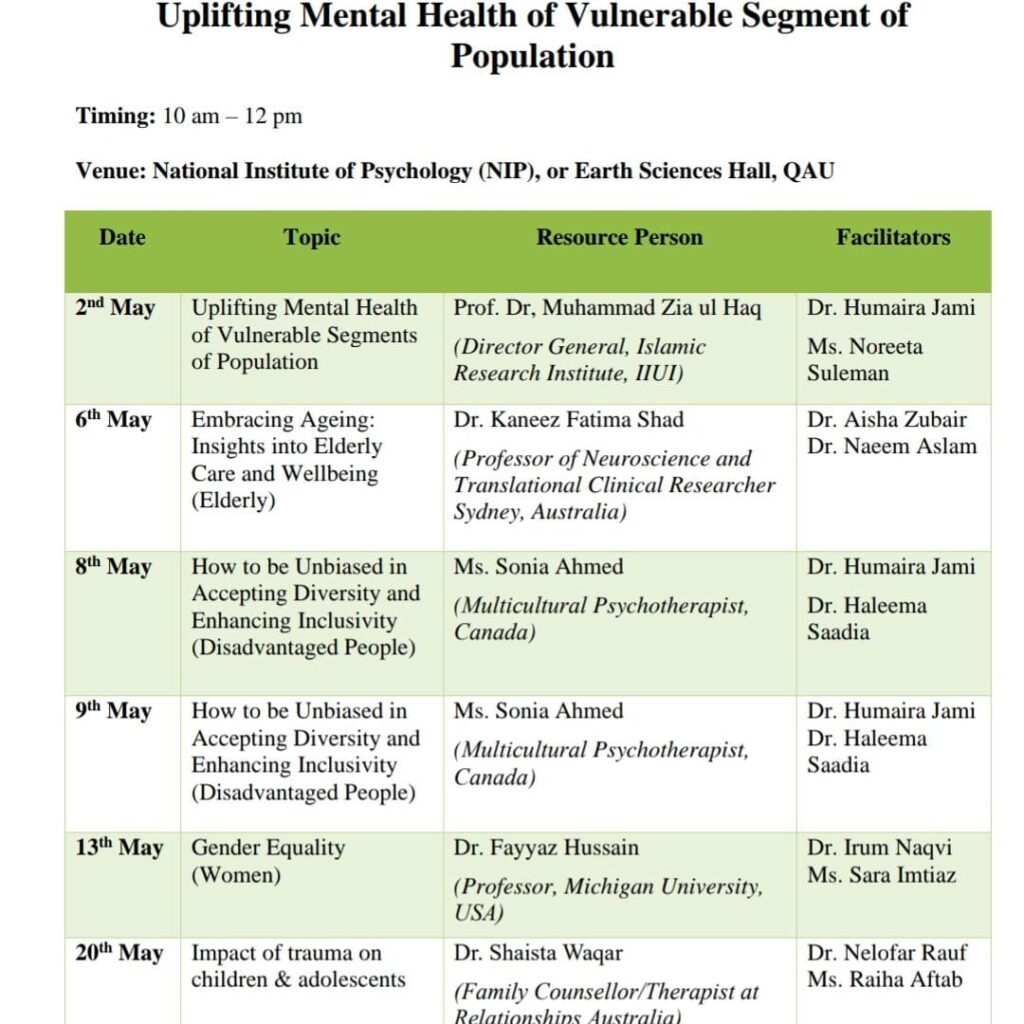
Webinar on Mental Health
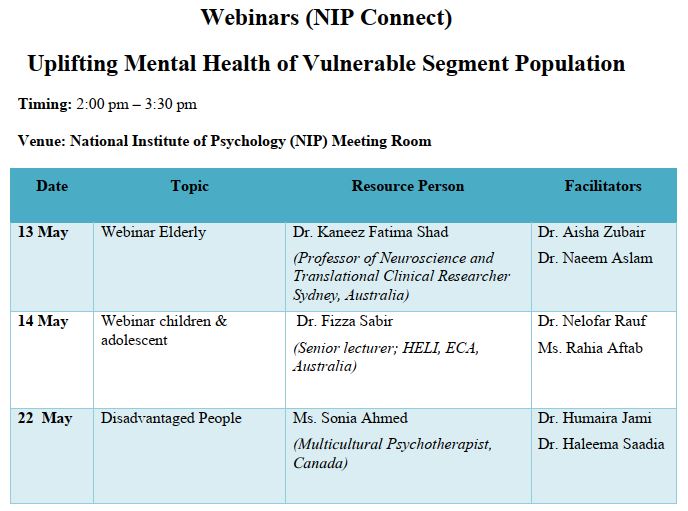
MEIDA TALK
Elderly Care: Sehat Sub Key Liyay (PTV News LIVE)
31st May 2024
Dr. Humaira Jami (Assistant Professor, Focal Person) was invited to talk about “Elderly Care” in programme Sehat Sab Key Liyay anchored by Dr. Shamaila Ghaffar on 31st May 2024. This was a live programme in which questions from audience were also taken in live. Dr. Humaira Jami shared the developmental changes throughout life span and significance to understand those to provide apt care. Significance of memory and its deterioration with age was discussed, she highlighted that short-term memory gets effected tremendously as compared to long-term memory. Socialization and active participation of elderly in daily household activities and post-retirement activities is key to reduce process of cognitive deterioration. During programme, many audiences shared their personal experiences and asked questions regarding effect on the memory, mood changes, depression with age and from where to get support for mental and physical health. Dr. Humaira shared that with age depression, anxiety, bipolar mood problems, dementia, Alzheimer, etc. increase with age that needs routine medical check-up and consultation with mental health professionals to make quantity of life of elderly better.
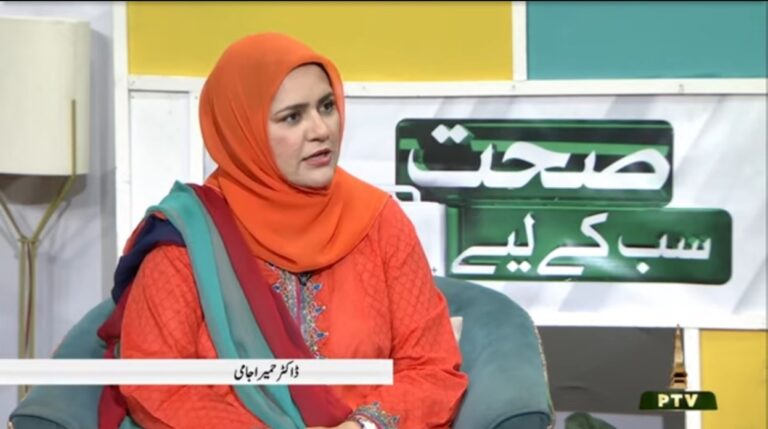
Foresight: Mental Health of Disadvantaged People
8th May, 2024
Mental Health of Disadvantaged People was the exclusive program telecasted on 8th May 2024 in Foresight series of PTV World anchored by Mr. Faisal Raza. Being an expert in the field of psychology, Dr. Humaira Jami (Assistant Professor, National Institute of Psychology) shared that disadvantaged individuals face stigma based upon their race, ethnicity, religion, caste, gender, sexual orientation, disability, or socioeconomic status that compromises their dignity, respect, and social inclusion. It challenges their mental health. Prevailing stereotypes and prejudices in society reduce the opportunities for such people to have better life and they remain closeted for the fear of discrimination and abuse. Internalized stigma and the culture of shaming of those who are different lead to depression, anxiety, suicide, substance use, etc. She also shared that NIP is working at multiple levels to uplift the mental health services to disadvantaged population. Dr. Murtaza Ahmed (Neurosurgeon, Sir Ganga Ram Hospital) added that resultantly stressors in life lead to various health issues including stress related infections, malnutrition, and other health problems. Being in socially weaker position, experiencing violence, abuse, and trauma are common in disadvantaged communities. They lack adequate support systems due to poverty, pushed to peripheries, displacement, housing insecurity, homelessness, or living in deprivation and unhygienic conditions exacerbate mental and physical health issues. Access to and availability of health care services for them is scarce. Dr. Malik Hammad Lang (Human Rights and Peace Educationist) stressed that most disadvantageous among all are women in minority status. Pakistan is overly legislative country and have many human rights commissions to uplift people in disadvantageous status. Unfortunately, implementation of laws drastically lags in every forum. Law enforcing agencies lack understanding of mechanism of implementation. After 18th Amendment, provincial governments are responsible to implement mental health policy. As per UN Sustainable Developmental Goals 3 and 4 uplifting mental health should be the priority of across the globe. Creating cordial relationships needs to be strengthened between majority and minority for better and happy living. Awareness of existing laws and policies are key to advocacy of rights of disadvantaged people at the grass root level. Dr. Humaira Jami stressed that as per Mental Health Act 2002, we need to promote advocacy of right to easy access and availability of mental health services, inclusivity of diversity, destigmatization of mental health problems, through public awareness and trainings of service providers and healthcare providers. Telemedicine can be the wonderful facility to make mental health services more accessible and available for people in stigmatised and disadvantageous status.
PODCAST
Radio Pakistan Podcast Highlights Socioeconomic Challenges and Mental Health of Disadvantaged Individuals
May 23, 2024
On May 23, 2024, Radio Pakistan conducted a significant podcast aimed at shedding light on the multifaceted issues faced by socioeconomically disadvantaged individuals. Hosted by Mr. Tasawwur Zaman Babar, the podcast featured experts in the field, Dr. Humaira Jami and Dr. Haleema Saadia Khan, both Assistant Professors at the National Institute of Psychology, Quaid-i-Azam University, Islamabad. The recorded audio from the program was aired on the Current Affairs Channel of Radio Pakistan on May 26, 2024.
The podcast delved into various crucial aspects concerning the understanding of disadvantaged communities and the complicated factors influencing their mental health. Key points addressed during the discussion encompassed the internalization of problems, assessment of issues with potential psychological health consequences, strategies for confronting personal biases when engaging with disadvantaged populations, and the role of psychosocial support in mitigating their challenges. Moreover, the panelists highlighted the importance of empowering disadvantaged individuals through the implementation of protective policies and laws, fostering empathy and active listening skills.
The conversation directed through the multitude challenges confronting disadvantaged individuals, including stigmatization, marginalization, abuse, trauma, violence, prejudice, and stereotypes. Additionally, the existing protection policies and laws in Pakistan to safeguard the rights and well-being of disadvantaged populations were discussed. The initiative undertaken by Radio Pakistan to spotlight the issues faced by socioeconomically disadvantaged individuals through this podcast serves as a commendable step towards fostering awareness and promoting inclusivity within society. By amplifying the voices of experts and engaging in meaningful dialogue, the program not only educates the public but also advocates for tangible solutions to address the systemic barriers hindering the progress and well-being of disadvantaged communities.
UPLIFTING MENTAL HEALTH OF ELDERLYs
19th May, 2024
This podcast was aired on Radio Pakistan on 19th May, 2024. This podcast aimed to educate the audience, caregivers, and healthcare professionals on the importance of mental healthcare for the elderly and to raise awareness about the social, psychological, and emotional needs of the elderly. Moreover, it also aimed to equip the audience with knowledge and skills to identify and address psychological, emotional, and social issues in the elderly. In this podcast session, the specific needs and requirements of elderly individuals were discussed that involved understanding the challenges encountered in various aspects
of life such as physical health, mental well-being, social interaction, and independence.
By exploring these unique needs, the audience can gain insights into how to tailor need-based support and interventions effectively enhance the quality of life for the elderly population. Dr. Naeem Aslam discussed the common mental health issues associated with aging, such as the prevalent neurological and psychological conditions that affect elderly individuals. This podcast offers insights into conditions like dementia, depression, and anxiety, and discussed their impact on cognitive function and emotional well-being. Addresses the often-overlooked issues of elder mistreatment, covering various forms such as physical, emotional, and financial abuse, and neglect. Dr. Aisha Zubair stated that it is assumed that the audience learns to recognize signs of mistreatment, understand its detrimental effects on the elderly, and explore strategies for prevention and intervention to ensure their safety and well-being.
Dr. Aisha Zubair and Dr. Naeem Aslam shared that the National Institute of Psychology, Centre of Excellence, Quaid-i-Azam University provides counseling and psych-social support for issues related to the needs of families and the elderly. In the context of present scenario of sociopolitical situation in Pakistan, everyone is facing the health-related issues and experts’ advice can be should be sought when needed.
Psychological needs of Children and Adolescents
6th May, 2024
Childhood and adolescence is a period of extreme importance for creating productive youngsters. A special radio podcast was organised by Radio Pakistan to highlight the need to cater to the current psychological needs of children and youngsters. The program was conducted on 6th of May 2024. Panellists Dr. Nelofar Rauf (Assistant Professor, National Institute of Psychology, Quaid-i-Azam University, Islamabad) and Ms. Raiha Aftab (Lecturer, National Institute of Psychology, Quaid-i-Azam University, Islamabad) and host Mr. Tasawur Hayat had a fruitful discussion on various aspects of trauma, psychosocial support and post traumatic growth. The panellists shared that parenting is not just about providing food and shelter; it plays a pivotal role in shaping the attitudes and outlook of children and adolescents. A growing body of research underscores the profound influence of parenting styles, behaviours, and interactions on the development of positive attitudes in young individuals, influencing their academic success, social relationships, and overall well-being.
Parents who exhibit warmth, responsiveness, and emotional support tend to raise children with a positive outlook on life. By fostering a nurturing environment characterized by love and acceptance, these parents instil in their children a sense of self-worth and confidence, laying the foundation for a positive attitude towards themselves and the world around them.
Moreover, the role of parental modeling cannot be overstated. Children learn by observing and imitating their parents’ behaviours and attitudes. When parents demonstrate resilience in the face of challenges, maintain an optimistic perspective, and practice gratitude and empathy, they provide powerful role models for their children to emulate. These positive behavioural cues help children develop adaptive coping strategies and a resilient mindset, essential components of a positive attitude.
Dr. Nelofar shared that National Institute of Psychology, Centre of Excellence, Quaid-i-Azam University provides counselling and psych-social support for issues related to the needs of families, children and adolescents. In the context of present scenario of sociopolitical situation in Pakistan, everyone is facing the health-related issues and experts’ advice can be/ should be sought when needed.
UPLIFTING MENTAL HEALTH OF WOMEN
5th May, 2024
In the context of present scenario of sociopolitical situation in Pakistan, everyone is facing the health related issues but women are more vulnerable, so the issue was discussed on Radio Pakistan in Current Affairs program on May 5, 2024. Dr. Irum Naqvi (Assistant Professor, National Institute of Psychology, Quaid-i-Azam University, Islamabad) and Ms. Sara Imtiaz (Research Associate cum Lecturer, National Institute of Psychology, Quaid-i-Azam University, Islamabad) participated in the program as experts. The points under discussion were as follows:
Women in Pakistan face multiple challenges due to the patriarchal society, cultural norms, and gender inequality, which can lead to mental health concerns. As per the careful estimation 50 million people (one in four) in Pakistan experienced mental health issues. Stigma and poor awareness is the common reason for that and do not seek help, and 90% of those needing treatment cannot access support.
With reference to developmental context, women are at disadvantage during the prenatal period, getting to know about gender of fetus, mother has to go through a lot of traumatic experiences. Then birth of a girl is taken as a matter of sorrow. Later on better eatables are offered to male children. Likewise, education and work related opportunities are prohibited later on.
In Pakistan, girls’ education is often neglected due to cultural and religious beliefs, leading to limited opportunities for women. This can lead to feelings of worthlessness, low self-esteem, and depression.
Gender-based violence including domestic violence, sexual harassment, and honour killings are of significant concern for women in Pakistan. Such violence can lead to post-traumatic stress disorder (PTSD), anxiety, and depression.
Women’s employment opportunities are limited in Pakistan, with many women facing discrimination in the workplace. This can lead to financial insecurity, low self-esteem, and depression.
Women in Pakistan often lack support from their families, communities, and the government, leading to a sense of isolation and loneliness, which can exacerbate mental health concerns.
Mental health is often stigmatized in Pakistan, with many people associating mental illness with weakness or lack of faith. This can prevent women from seeking help and support for their mental health concerns.
Strategies to Improve Mental Health
As experts it was discussed that there are several solutions that can help to empower women in Pakistan and elevate their mental well-being. Some of these solutions include:
Improve education for girls. This include building more schools and providing scholarships and financial support for girls to attend school.
The government should pass and enforce laws that protect women’s rights, including laws against gender-based violence, sexual harassment, and discrimination in the workplace.
The government and private sector should work together to create more job opportunities for women, particularly in sectors that are traditionally male-dominated. This includes providing training and skills development programs.
There needs to be greater awareness and acceptance of mental health issues in Pakistan, particularly among women. This includes promoting mental health services and support systems, as well as educating the public about mental health.
Families, communities, and religious leaders can play an important role in supporting women’s empowerment and mental health. They can promote gender equality, reduce stigma around mental health, and provide emotional and social support to women in need.
The media and technology can be powerful tools for women’s empowerment, particularly in remote or marginalized communities. The government and private sector should promote access to information and communication technologies and creative media campaigns that promote gender equality and mental health awareness.
In conclusion, empowering women in Pakistan and improving their mental well-being requires a multi-faceted approach that involves government, private sector, civil society, and communities working together. By promoting education, legal reforms, economic empowerment, mental health awareness, community support, and media and technology, we can create a more just and equitable society where women can thrive.
News Reports
Seminar on
Identities of Transgender Persons: Medical Evidence-Based Perspective
30th May 2024
Organizer: Ministry of Human Rights (MOHR)
Venue: Polyclinic Hospital, Islamabad
Dr. Humaira Jami (Assistant Professor, Focal Person) delivered a seminar to sensitize healthcare providers including doctors, nurses, and paramedical staff of Polyclinic Hospital, Islamabad on 30th May 2024 about diversity in transgender communities and mental health issues. Ms. Reem Sharif (Deputy Director, Transgender Unit, MOHR) convened the seminar while Ms. Babra Zaheer (Social Welfare Officer, MOHR) in Polyclinic Hospital was the organizer. Dr. Humaira Jami shared correct terminologies related to sex, gender, and sexuality that explain diversity in transgender and khawajasira communities. She highlighted the need to have correct knowledge to identify mental and physical health issues experienced by this disadvantaged group. She provided the medical evidence including genetics, hormonal, chromosomal, and brain changes that are implicated in gender diverse identities. She discussed gender dysphoria/congruence as described in ICD-11 and DSM 5-TR. She highlighted that how transgender people are stigmatised based upon prevailing societal practices based upon heterosexism, binary concept of gender, etc. Stigma, resultant marginalization, and discrimination lead to high incidences of mental health problems including PTSD, depression, anxiety, suicidal ideation, substance use, etc. among transgender people. Health issues emerging of living in deprivation include HIV/STDs, health complications because of indulging in self-remedies in context of affirming their gender identity, etc. were discussed. She stressed that healthcare providers need to have up to date knowledge about transgender healthcare needs so that they could provide quality care and referral in handling health complications in apt way. She tried to break the myths about the khawjasira people that are biggest hurdle for understanding the plight of these people and how it effects transgender people to access existing healthcare facilities. Director Welfare, Mr. Arif Shamim, gave concluding remarks and gave away shield to the speaker as token of appreciation.
2-Days Training Workshop on
Uplifting Mental Health of Women: Trauma, Violence and its Impact on Mental Health and Wellbeing of Women
29-30 May, 2024
A 2-day training workshop on “Trauma, Violence and its Impact on Mental Health and Wellbeing of Women” was organized by the National Institute of Psychology on 29th-30th, May 2024. The resource persons of the workshop were Prof. Dr. Fayyaz Hussain working in Center for Integrative Studies, Social Science, Michigan State University, USA and Ms. Maqsooda Solangi, Coordinator Women Empowerment, Aurat Foundation, Pakistan were the resource persons for this workshop.
It was the third workshop on the theme of women same workshop was carried out in series. The third cohort of the participants were rendering their services in public and private sector organizations of Pakistan namely, Shifa International Hospital, Rawalpindi Institute of Cardiology, Bahria University Islamabad, Women Development Department, Govt. of AJK, Fatima Jinnah Women University (FJWU), Rawalpindi, Global Peace and Harmony-UK, DHQ Hospital Bajaur, Next-Gen Impact, Khar, Govt. Degree College Rehmatabad Rawalpindi, Pakistan Institute of Living and Learning, Rawalpindi Women University, and Milestone Institute of Arts and Science Chakwal attended the workshop.private sector organizations of Pakistan namely, National Psychiatric Hospital and Rehabilitation Centre, Shifa Caring Centre, PIMS, Akbar Niazi Teaching Hospital, Happy Life Psychological Services, Sidra Akhtar Foundation Drug and Psychological Rehabilitation Centre, Franklin Covey Education Islamabad, and Apples the Grooming School in the workshop.
There were three learning modules comprising six technical sessions planned in two days’ focusing on familiarizing the participants with possible trauma and violence and its impact on mental health challenges faced by women in Pakistan. Trainers specifically focused on how violence is a most common threat to women’s mental health. Moreover, during the training participants were encouraged to understand barriers and vulnerability of women and girls. Participants learned to review developmental history of the women’s struggles. Evaluation was done with reference to cultural stigmas and traditional practices regarding the mental health. There was emphasis with respect to participant’s role within their service domains as mental health psychosocial support providers, health care providers, or social workers to learn the strategies to handle the cases and focus on exploring adaptation of best practices making way to sound health of women. In the last session major key takeaways and corresponding action plan were generated in terms of meaningful social activities to uplift and enhance their mental health and improving their quality of life. Participants were engaged in rigorous practical exercises such as role plays, hand on exercises, expressive journaling sessions, volunteer opportunities, team building initiatives, and active listening sessions. Participants were very appreciative of the fact that workshop was based on activity-based learning through they learnt a great deal about plan of action in their respective field of work.
Dr. Iram Naqvi, Assistant Professor and Ms. Sarah Imtiaz Research Associate cum Lecturer at NIP contributed developing insights into indigenous issues of women. The concluding ceremony of the workshop was graced by Ms. Nigar Nazar a female cartoonist. Ms. Nagar’s best-known character, Gogi, is an urban Pakistani woman struggling with her frailties in the context of sexist social norms. The character was created to educate people about social and educational advocacy problems. She is the chief executive officer of Gogi Studios. Ms Nagar appreciated and commended the wonderful services of National Institute of Psychology. This literary community collaborative outreach was the vision of Prof. Dr. Rubina Hanif, Director National Institute of Psychology. This workshop was held in collaboration with the International Organization for Migration (IOM). It aimed to enhance awareness, knowledge, and skills related to uplifting the mental health and empowerment of women.
2-Days Training Workshop on
Uplifting Mental Health of Children and Adolescents
27-28 May, 2024
The third workshop in the series on “Uplifting Mental Health of Children and Adolescents” was conducted on the 27th and 28th of May 2024, at the National Institute of Psychology, Centre of Excellence, Quaid-i-Azam University, Islamabad. The workshop featured Dr. Shaista Waqar, a family counselor and therapist from Relationships Australia, as the resource person.
On the first day, the workshop addressed trauma in children and adolescents. Dr. Waqar explained the differences between trauma, violence, and abuse, noting that trauma can manifest through various symptoms such as anxiety, depression, post-traumatic stress disorder, and attention deficit hyperactivity disorder. These symptoms can be internalized or externalized and include physical, psychosomatic, emotional, and cognitive effects. Dr. Waqar emphasized the long-term impact of trauma on children’s cognitive, emotional, and social development, stressing the need for early intervention and support. She also highlighted the increased public expenditure on child welfare, special education, and medical and psychological services due to violence among children and identified barriers to these efforts. In the final session of the first day, the psychosocial well-being of individuals or groups facing trauma was discussed, particularly those experiencing mental illness. Dr. Waqar underscored the importance of community mapping to identify and address the diverse and immediate needs of trauma survivors, as well as the need for resource exchange and collaboration.
The second day of the workshop focused on promoting the overall well-being of children and adolescents. Dr. Waqar shared indigenous Pakistani examples to illustrate various methods for enhancing well-being, including healthy sleep habits, mindfulness, reduced screen time, gardening, and art. She discussed well-being in the context of resources and challenges, including risk and protective factors. Dr. Waqar emphasized the development of coping skills, resilience, and emotional regulation in children and adolescents. She recommended healthy coping strategies and creative activities tailored to the developmental needs of each child. For teachers and parents, she advised fostering resilience in children, helping them identify their emotional triggers, and preparing them to handle stressful situations.
The two-day workshop was facilitated by Assistant Professor Dr. Nelofar Kiran and Ms. Raiha Aftab, who effectively engaged participants in active dialogue. It was the last workshop of the series of workshops on uplifting mental health of children and adolescents, Brig (R). Prof. Dr. Tanvir Akhtar Ex Chief Psychologist Armed Forces, Sitara-i-Imtiaz military, Chairperson Foundation University graced at the concluding ceremony of the workshop. He highly appreciated NIP his alma matter growing at a tremendous pace. He admired not only the academic and research activities rather he was pleased on outreaching the community and capacity building of professionals and other stakeholders. Shields and souvenirs were given to the resource person and the chief guest. The workshop’s success was achieved under dynamic and visionary perspective of Professor Dr. Rubina Hanif, Director National Institute of Psychology, in collaboration with the International Organization of Migrants (IOM). This workshop was part of the project “Uplifting Mental Health of Vulnerable Segments of Population.” The workshop provided valuable insights and practical strategies for addressing the mental health needs of children and adolescents. It highlighted the importance of early intervention, community support, and tailored approaches to fostering resilience and well-being among young individuals.
2-Days Training Workshop on
Uplifting Mental Health of Children and Adolescents
24-25 May, 2024
The second series of the workshop on “Uplifting Mental Health of Children and Adolescents” was conducted on the 24th and 25th of May 2024 at the National Institute of Psychology, Centre of Excellence, Quaid-i-Azam University, Islamabad. The workshop was led by Dr. Shaista Waqar, a family counselor and therapist from Relationships Australia.
The first day of the workshop focused on trauma in children and adolescents. Dr. Waqar discussed the distinctions between trauma, violence, and abuse, noting that trauma can present through various symptoms such as anxiety, depression, post-traumatic stress disorder (PTSD), and attention deficit hyperactivity disorder (ADHD). These symptoms can be internalized or externalized and include physical, psychosomatic, emotional, and cognitive manifestations. Dr. Waqar emphasized the long-term effects of trauma on children’s cognitive, emotional, and social development, underscoring the importance of early intervention and support. She also highlighted how violence among children increases public expenditure on child welfare, special education, and medical and psychological services, and identified barriers to these welfare efforts.
The final session of the first day addressed the psychosocial well-being of individuals or groups facing trauma, particularly those experiencing mental illness. Dr. Waqar stressed the importance of community mapping to identify and address the diverse and immediate needs of trauma survivors, as well as the need for resource exchange and collaboration. The second day of the workshop focused on the overall well-being of children and adolescents. Dr. Waqar shared indigenous Pakistani examples to illustrate how well-being can be promoted through healthy sleep, mindfulness, reduced screen time, gardening, and art. She discussed well-being in the context of available resources and challenges, including risk and protective factors.
Dr. Waqar emphasized the development of coping skills, resilience, and emotional regulation in children and adolescents. She recommended healthy coping strategies and creative activities tailored to the developmental needs of each child. For teachers and parents, she advised fostering resilience in children, helping them identify their emotional triggers, and preparing them to acknowledge and handle stressful situations. The two-day workshop was facilitated by Assistant Professor Dr. Nelofar Kiran and Ms. Raiha Aftab, who effectively engaged participants in active dialogue. The success of the workshop was achieved under the guidance and practical support of Professor Dr. Rubina Hanif, Director of the National Institute of Psychology, in collaboration with the International Organization of Migrants (IOM). This workshop was part of the project “Uplifting Mental Health of Vulnerable Segments of Population.” The workshop provided valuable insights and practical strategies for addressing the mental health needs of children and adolescents. It emphasized the importance of early intervention, community support, and tailored approaches to fostering resilience and well-being among young individuals.
2-Days Training Workshop on
Uplifting Mental Health of Children and Adolescents
22-23 May, 2024
The two days workshop on “Uplifting Mental Health of Children and Adolescents” was conducted on 22nd and 23rd May 2024, at National Institute of Psychology, Centre of Excellence, Quaid-i-Azam University, Islamabad. The resource person of the two days was Dr. Shaista Waqar from Family Counsellor/Therapist at Relationships Australia.
On day one of the workshop trauma in children and adolescents was discussed. The resource person elaborated the difference between trauma, violence and abuse. Trauma can manifest in various symptoms, such as anxiety, depression, post-traumatic stress disorder (PTSD), and attention deficit hyperactivity disorder (ADHD) having both internalized and externalized, physical, psychosomatic, emotional and cognitive symptoms. Moreover, she discussed the long-term effects of trauma on children’s cognitive, emotional, and social development, emphasizing the need for early intervention and support. Later, it was emphasized how violence among children increase public expenditure on child welfare, special education, and medical and psychological services for victims, and also barriers for these welfare works. In the last session of day one psychosocial well-being of the individual or group of people facing trauma was discussed with reference to individuals experiencing mental illness. Lastly she focused on community mapping where diversity of survivors is there, with immediate needs, having considerations for accessibility and need for resource exchange and collaboration.
Day two of the workshop thoroughly captured well-being of children and adolescents. Dr. Waqar shared indigenous Pakistani examples of children and ways to induce well being in them by many ways including healthy sleep, mindfulness, reduced screen time, gardening, and art. She discussed well-being in terms of resources and challenges (risk and protective factors). She focused on developing coping skills, resilience & emotional regulation in children and adolescents. It was recommended to use healthy coping strategies and use creativity as according to the developmental need of the child. For teachers and parents, it was advised to make their children resilient, help identifying their emotional triggers, and prepare for acknowledging stressful situations.
The two-day workshop was facilitated by Assistant Professor Dr. Nelofar Kiran and Ms. Raiha Aftab, who effectively encouraged active dialogue among the participants. The workshop’s success was achieved under the management and directions of Professor Dr. Rubina Hanif, Director of the National Institute of Psychology, in collaboration with the International Organization of Migrants (IOM). This initiative was part of the project titled “Uplifting Mental Health of Vulnerable Segments of Population.”
2-Days Training Workshop on
Uplifting Mental Health of Socio-economically Disadvantaged Individuals
20-21 May, 2024
A 2-day training workshop on Uplifting Mental Health of Socio-economically Disadvantaged Individuals was organized by the National Institute of Psychology on 20-21, May 2024. It was the third workshop of the series. The resource person for the workshop was Ms. Sonia Ahmed, a multicultural psychotherapist from Canada, specializing in culturally sensitive counselling and psychotherapy.
There were four learning modules that were based on eight sessions executed in two days. On day one module 1 and module 2 were covered where module 1 was understanding of disadvantaged communities that was elaborated in two sessions, understanding disadvantaged communities with practical implications in healthcare settings and factors underlying mental health of disadvantaged people. Module 2 focused on assessment of mental and physical health problems in disadvantaged communities. It was carried out in two sessions, assessment of internalizing problems and assessment of problems having physical health outcomes. Module 3 and module 4 were discussed on day two of the workshop. The focus of module 3 was disadvantaged populations: treatment and interventions spanned in two sessions i.e., addressing personal biases when working with disadvantaged populations and therapeutic interventions. Module 4 empowering disadvantaged people was spanned over three sessions i.e., 1. Protection policies and laws, 2. Strengthening support system and 3. Counselling skills.
Ms. Ahmad covered various aspects of the challenges faced by disadvantaged people, including stigmatization, marginalization, abuse, trauma, violence, prejudice, and stereotypes. She also discussed factors influencing disadvantaged status, such as human trafficking and domestic abuse etc. The assessments of various psychological problems were done through hand on activities, such as role plays, brain storming, and discussions. Additionally, Ms. Ahmad highlighted the existing protection policies and laws in Pakistan for disadvantaged individuals.
The third cohort of the participants was from various reputed organizations in the twin cities such as AFIMH (Armed Forces Institute of Mental Health), Wellbeing Center Bahria University, Children Amputees Rehabilitation Program , DHQ (District Head Quarters) Hospital, Attock, DHQ Bajour, Hanif Medical Complex, Hayat Rehab, Hero healthcare, Institute of Medical Sciences, KMU, Ministry of Human Rights, NUMS, Punjab Higher Education Department, Quaid I Azam University, Riphah International University , Sathi Foundation, Shifa Tameer e Millat, University of Sahiwal, and Islamabad Rehab Clinic .
Serious concerns related to implementation of advocacy acts were raised by the participants along with gaining insights into the lived experiences and challenges faced by disadvantaged communities and fostering empathy. Dr. Wajid CEO Roots Pakistan/Senior Editor (Violence and Trauma) VAT, Canada honored in the concluding ceremony of the workshop, he raised grave concerns on prevalence of mental health problems worldwide with a wide rise in number, he further added that the disadvantaged populations worldwide face more mental health challenges. Dr. Pirzada appreciated team NIP for providing community outreach programs and capacity building. Dr. Rubina Hanif director National Institute of Psychology warmly welcomed the participants, and she was looking forward for future collaborations and long-term relationships on the joint venture of uplifting mental health of the vulnerable segments. This workshop is successful because of Centre of Excellence’s visionary and missionary leadership in collaboration with International Organization of Migrants.
Seminar on
Impact of Trauma on Children and Adolescents
May 20, 2024
The seminar on “Impact of Trauma on Children and Adolescents” by Dr. Shaista Waqar, organized by the National Institute of Psychology in collaboration with the International Organization for Migration (IOM), on 20th may, 2024. It was a comprehensive and insightful event that delved into the critical issue of trauma among young individuals in Pakistan. Dr. Shaista, a renowned expert in the field and therapist at Relationship
Australia emphasized the significance of acknowledging trauma’s impact on children and adolescents, particularly in a country like Pakistan where traumatic events are prevalent. She highlighted the importance of addressing trauma in Pakistan, where children and adolescents are exposed to various traumatic events, including natural disasters, terrorism, domestic violence, and physical and emotional abuse. She emphasized that trauma can be a single event, recurring, complex, and inter-generational as well which has long-lasting effects on young minds, affecting their biological, cognitive, emotional, and social development.
She explained that trauma can manifest in various symptoms, such as anxiety, depression, post-traumatic stress disorder (PTSD), and attention deficit hyperactivity disorder (ADHD) having both internalized and externalized, physical, psychosomatic, emotional and cognitive symptoms. Moreover, she discussed the long-term effects of trauma on children’s cognitive, emotional, and social development, emphasizing the need for early intervention and support. The seminar also explored the cultural and societal factors that contribute to trauma in Pakistani society, such as gender-based violence and societal expectations. Dr. Waqar discussed how these factors can exacerbate the impact of trauma on children and adolescents, making it essential to address these underlying issues. The seminar emphasized the need for a collaborative effort from parents, educators, mental health professionals, and policymakers to create a supportive environment using trauma informed model that acknowledges the maladaptive behaviors of children and adolescents that fosters resilience and promotes healing for traumatized children and adolescents ensuring the safety and possible psychological aid.
The seminar concluded with a focus on trauma recovery, highlighting the importance of a trauma-informed approach in schools, communities, and mental health settings using stabilization, re-processing and re-programming. Dr. Shaista discussed evidence-based interventions, such as trauma-focused cognitive-behavioral therapy (TF-CBT) and eye movement desensitization and reprocessing (EMDR), that can help children and adolescent’s process and overcome traumatic experiences. The seminar emphasized the need for a collaborative effort from parents, educators, mental health professionals, and policymakers to create a supportive environment that fosters resilience and promotes healing for traumatized children and adolescents in Pakistan. Overall, the seminar was a crucial step towards creating a trauma-sensitive society, and its impact will undoubtedly resonate with the audience for a long time. The event provided a platform for mental health professionals, educators, and policymakers to come together and discuss the critical issue of trauma among children and adolescents in Pakistan. The seminar’s emphasis on trauma recovery and resilience highlighted the importance of early intervention and support, and the need for a collaborative effort to address the long-lasting effects of trauma on young minds.
2-Day Training Workshop on
Uplifting Mental Health of Socio-economically Disadvantaged Individuals
May 16-17, 2024
A 2-day training workshop on Uplifting Mental Health of Socio-economically Disadvantaged Individuals was organized by the National Institute of Psychology on 16-17, May 2024. It was the second workshop of the series. The resource person for the workshop was Ms. Sonia Ahmed, a multicultural psychotherapist from Canada, specializing in culturally sensitive counselling and psychotherapy.
There were four learning modules that were based on eight sessions executed in two days. On day one module 1 and module 2 were covered where module 1 was understanding of disadvantaged communities that was elaborated in two sessions, understanding disadvantaged communities with practical implications in healthcare settings and factors underlying mental health of disadvantaged people. Module 2 focused on assessment of mental and physical health problems in disadvantaged communities. It was carried out in two sessions, assessment of internalizing problems and assessment of problems having physical health outcomes. Module 3 and module 4 were discussed on day two of the workshop. The focus of module 3 was disadvantaged populations: treatment and interventions spanned in two sessions i.e., addressing personal biases when working with disadvantaged populations and therapeutic interventions. Module 4 empowering disadvantaged people was spanned over three sessions i.e., 1. Protection policies and laws, 2. Strengthening support system and 3. Counselling skills.
Ms. Ahmad covered various aspects of the challenges faced by disadvantaged people, including stigmatization, marginalization, abuse, trauma, violence, prejudice, and stereotypes. She also discussed factors influencing disadvantaged status, such as human trafficking and domestic abuse etc. The assessments of various psychological problems were done through hand on activities, such as role plays, brain storming, and discussions. Additionally, Ms. Ahmad highlighted the existing protection policies and laws in Pakistan for disadvantaged individuals.
Dr. Humaira Jami Assistant Professor at NIP with her PhD and Post-Doctoral studies in Gender Psychology commenced in day-2 of the workshop. Dr. Jami reflected on gender biases, prejudices, and stereotypes with indigenous examples. The available policies on harassment, domestic violence, child abuse were discussed elaborately with practical insights and group discussions. This session was well equipped by resource pack and available tools to measure biases. Later, Dr. Naeem Aslam Assistant Professor NIP and a clinical psychologist provided valuable counselling skills such as empathy, active listening skills and ability to communicate well with the client in a safer way. Dr. Aslam shared his expertise on keeping consideration of the ethical standards while counselling. Ms. Ahmad concluded the workshop by providing her insight on strength-based counselling skills.
The second cohort of the participants in the workshop were clinical psychologists, academicians, therapists, speech language pathologists, counsellors, medical practitioners, child psychologists, political activists and internees from a wide array of public and private organizations such as Progressive Student Federation, Shifa Tameer e Millat University, Wah Medical College, Fauji Foundation Hospital, Benazir Bhutto Hospital, Zeal and Zest Learning Institute, Basic Education Community School, GC Women University Sialkot, District Health Unit Attock, ZAN, Govt. Postgraduate College Abbottabad and Riphah International University.
The workshop was facilitated by Assistant Professors, Dr. Humaira Jami, and Dr. Haleema Saadia, successfully fostered active engagement and dialogue among participants, allowing for in-depth discussions on promoting inclusivity and support for disadvantaged populations in Pakistan. Participants raised significant concerns, particularly regarding the implementation of advocacy acts, highlighting the need for deeper exploration of policy advocacy strategies and legal frameworks, for domestic violence, harassment, sexual abuse, and child protection policies. Participants gained insights into the lived experiences and challenges faced by disadvantaged communities, fostering empathy, and understanding that can inform more inclusive and equitable practices in their professional and personal lives. The workshop was made successful under the guidance and practical support of Director National Institute of Psychology Professor Dr. Rubina Hanif in collaboration with International Organization of Migrants.
2-Day Training Workshop on
Uplifting Mental Health of Socio-economically Disadvantaged Individuals
May 13-14, 2024
A 2-day training workshop on Uplifting Mental Health of Socio-economically Disadvantaged Individuals was organized by the National Institute of Psychology on 13-14, May 2024. The resource person for the workshop was Ms. Sonia Ahmed, a multicultural psychotherapist from Canada, specializing in culturally sensitive counselling and psychotherapy.
There were four learning modules that were based on eight sessions executed in two days. On day one module 1 and module 2 were covered where module 1 was understanding of disadvantaged communities that was elaborated in two sessions, understanding disadvantaged communities with practical implications in healthcare settings and factors underlying mental health of disadvantaged people. Module 2 focused on assessment of mental and physical health problems in disadvantaged communities. It was carried out in two sessions, assessment of internalizing problems and assessment of problems having physical health outcomes. Module 3 and module 4 were discussed on day two of the workshop. The focus of module 3 was disadvantaged populations: treatment and interventions spanned in two sessions i.e., addressing personal biases when working with disadvantaged populations and therapeutic interventions. Module 4 empowering disadvantaged people was spanned over three sessions i.e., 1. protection policies and laws, 2. strengthening support system and 3. counselling skills.
Ms. Ahmad covered various aspects of the challenges faced by disadvantaged people, including stigmatization, marginalization, abuse, trauma, violence, prejudice, and stereotypes. She also discussed factors influencing disadvantaged status, such as human trafficking and domestic abuse etc. The assessments of various psychological problems were done through hand on activities, such as role plays, brain storming, and discussions. Additionally, Ms. Ahmad highlighted the existing protection policies and laws in Pakistan for disadvantaged individuals.
The participants of the workshop were clinical psychologists, academicians, therapists, speech language pathologists, counsellors, medical practitioners, shadow teachers, child psychologists, and internees from a wide array of public and private organizations such as Alkaramzada International Network, Abeer ul Haq studio, Bahria University, Riphah International University, International Open University, National University of Technology, Quaid-i-Azam University, PIMS Hospital, Happy Life Psychological Services, Pakistan Railway Hospital, SOS Child Village, Pakistan Railway Hospital, Soch Clinic Media Town, Edopia School, and Beaconhouse Newland.
The workshop was facilitated by Assistant Professors, Dr. Humaira Jami and Dr. Haleema Sadia, successfully fostered active engagement and dialogue among participants, allowing for in-depth discussions on promoting inclusivity and support for disadvantaged populations in Pakistan. Participants raised significant concerns, particularly regarding the implementation of advocacy acts, highlighting the need for deeper exploration of policy advocacy strategies and legal frameworks, especially for the transgender community. Participants gained insights into the lived experiences and challenges faced by disadvantaged communities, fostering empathy, and understanding that can inform more inclusive and equitable practices in their professional and personal lives. The workshop was made successful under the visionary leadership and practical support of Professor Dr. Rubina Hanif director National Institute of Psychology in collaboration with International Organization of Migrants.
Seminar on
Gender Inequality in Contemporary Societies: History, Challenges, and Resolutions
May 13, 2024
On May 13th, 2024, the National Institute of Psychology, Quaid-I-Azam University, hosted a seminar titled “Gender Inequality in Contemporary Societies: History, Challenges, and Resolutions” featuring Professor Dr. Fayyaz Hussain from Michigan State University, USA, as the resource person. Fayyaz Hussain, Professor of Integrative Studies in the College of Social Science at Michigan State University. Professor Hussain’s teaching career in Sociology began in Pakistan in 1975. He continued teaching Sociology in Nigeria, Canada, and finally in the USA. After moving to Michigan State University in 1986, he has taught in the Department of Sociology, the Center for Criminal Justice, and for the past 26 years at the Center for Integrative Studies in Social Sciences. The seminar aimed to explore the origins of gender inequality, the ongoing challenges it presents, and potential solutions to address it. Dr. Fayyaz, drawing on his expertise, provided insights into the historical roots of gender inequality from a sociological perspective. He not only illuminated the intricate dynamics that perpetuate inequality but also offered practical remedies to mitigate its effects. The seminar witnessed active participation from 50 attendees representing various organizations from Islamabad and Rawalpindi. Dr. Fayyaz’s engaging presentation fostered an extremely interactive environment, allowing for fruitful discussions and exchange of ideas. The audience praised him for his deep knowledge and skill in simplifying complex ideas, making the topic easy to understand. During the seminar, one participant emphasized the necessity for structural reforms to effectively eradicate gender inequality from society. Another participant highlighted the importance of genuine Islamic teachings in safeguarding the rights of women and promoting equality. Moreover, Dr. Fayyaz invited all the participants to write down the possible solutions with reference to the indigenous scenario of Pakistan on paper and they all shared their views in writing. In the end common solutions were shared with the all participants. The event was smoothly facilitated by Dr. Irum Naqvi and Ms. Sara Imtiaz, who ensured that the seminar proceeded seamlessly, allowing for maximum engagement and learning opportunities for all participants.
Seminar on
How to be Unbiased in Accepting Diversity and Enhancing Inclusivity
May 9, 2024
National Institute of Psychology at Quaid-i-Azam University, Islamabad, hosted a seminar titled “How to be Unbiased in Accepting Diversity and Enhancing Inclusivity,” on May 09, 2024. The resource person of this seminar was Ms. Sonia Ahmad, a Canadian Clinical Counsellor and Registered Psychotherapist known for her expertise in multicultural therapy from Yorkville University. She has dedicated her career to caring for disadvantaged populations through her private practice. The seminar commenced with an inaugural session by the worthy Director of the National Institute of Psychology, Professor Dr. Rubina Hanif, who warmly welcomed Ms. Sonia Ahmad and all the participants. The facilitators for the seminar were Dr. Humaira Jami and Dr. Haleema Saadia. The objectives of the seminar were outlined to enhance empathy, move away from shame-based culture, and raise awareness of existing laws and policies for vulnerable populations in Pakistan. Ms. Sonia Ahmad’s presentation was engaging and thought-provoking, encouraging active participation from the attendees. Her expertise and passion for promoting safe and supportive spaces for diverse individuals on their healing journeys were evident throughout the seminar. Participants from diverse organizations praised Ms. Ahmad’s ability to articulate complex concepts with clarity and empathy, making the seminar both informative and inspiring. Overall, the seminar was a resounding success due to the collaborative efforts of all involved. It served as a catalyst for promoting diversity, inclusivity, and empathy within the field of psychology and beyond.
2-Day Training Workshop on
Uplifting Mental Health of Elderly
May 8-9, 2024
On May 8th and 9th, 2024, the National Institute of Psychology hosted the third series of two-days training workshop on “Uplifting Mental Health of Elderly.” Dr. Kaneez Fatima Shad professor in Neuroscience and Translational Clinical Researcher from Sydney, Australia, led the workshop as a resource person.
The workshop covered a spectrum of neurological and psychological problems faced by elderly such as trauma, abuse, neglect, and intervention strategies in six sessions. The workshop focused on equipping participants to identify and address challenges faced by elderly individuals, such as cognitive decline and abuse. Through interactive sessions, participants gained practical skills in screening, diagnosis, and intervention specifically designed for elderly populations. Collaboration was also a key theme, with the workshop fostering communication and teamwork among healthcare providers. The third cohort of the participants was form: Pak Young Psychologists Academy, Riphah International, Subhan Medical Center, International Open University, Global School of Special Children, Siraat Serving Humanity, Rawalpindi Teaching Hospital, Ali Medical Hospital, Happy Life Psychological Services, Medicine Sans Frontiers, National Institute of Psychology, College of Dentistry, Foundation University, Hope Society Pakistan, International Islamic University, National University of Medical Sciences, Counselling and Psychotherapy Central Awarding Body (British Association for Counselling and Psychotherapy), District Head Quarters.
Immersive activities like lectures, group discussions, role-playing, and case studies intensified the learning journey. With a diverse audience comprising healthcare professionals and mental health and psychosocial support, the workshop fostered meaningful exchanges and collaborative learning opportunities in identifying elderly mental health challenges and implementing effective well-being strategies. Dr. Naeem Aslam and Dr. Aisha Zubair Assistant Professors at NIP contributed developing insights into indigenous issues of elderly individuals. Professor. Dr. Zafar Nawaz Jaspal dean social sciences graced the event as it was the last series of workshop on uplifting mental health of elderly. Dr. Jaspal presented shields and appreciated Ms. Shad and team NIP for capacity building and trainings of healthcare practitioners. This valuable platform, under dynamic and visionary Prof. Dr. Rubina Hanif, Director of the National Institute of Psychology, was held in collaboration with the International Organization for Migration (IOM). It aimed to enhance awareness, knowledge, and skills related to uplifting the mental health of the elderly population.
Seminar on
How to be Unbiased in Accepting Diversity and Enhancing Inclusivity
May 8, 2024
On May 8th, 2024, the National Institute of Psychology at Quaid-i-Azam University, Islamabad, hosted a seminar titled “How to be Unbiased in Accepting Diversity and Enhancing Inclusivity.” The seminar, facilitated by Dr. Humaira Jami and Dr. Haleema Saadiya, featured Ms. Sonia Ahmad, a distinguished Canadian Clinical Counsellor and Registered Psychotherapist, Ms. Ahmad completed her Master of Arts in Clinical and Counselling Psychology from Yorkville University. She has dedicated her career to caring for disadvantaged populations through her private practice, The Multicultural Therapist. Her areas of expertise include Applied Behavior Analysis (ABA) for children with autism, multiculturalism, and inclusivity. as the resource person. The seminar began with an opening session led by the esteemed Director of the National Institute of Psychology, Professor Dr. Rubina Hanif, who extended a warm welcome to Ms. Sonia Ahmad and all the attendees. Ms. Ahmad’s insightful contributions added depth and resonance to the seminar, enriching the discourse on diversity and inclusivity. The seminar aimed to achieve several objectives, including fostering an understanding of biases and stereotypes, exploring strategies to promote inclusivity in diverse settings, and enhancing empathy and cultural competence among participants, engaging in spirituality for improving mental health. Attendees hailed from esteemed organizations of Islamabad and Rawalpindi. The session was characterized by its interactive and engaging nature, encouraging active participation and meaningful exchanges among participants. Participants raised questions regarding religiosity in mental health, highlighting the significance of spirituality, while religious scholars emphasized its role. One transgender participant appreciated the diversity of the forum, suggesting the need for more such seminars. With a diverse array of attendees, including student affairs and administrative in-charge, faculty members, religious scholars, paramedics, clinical psychologists, mental health practitioners, police personnel and directors fostered a collaborative atmosphere conducive to learning and growth. Overall, it served as a platform for dialogue and reflection, paving the way for greater inclusivity and understanding in the community.
Seminar on
Embracing Aging: Insight into Elderly Care and Well-being
May 6, 2024
The seminar titled “Embracing Aging: Insight into Elderly Care and Wellbeing,” held on May 6, 2024, at the National Institute of Psychology, Quaid-i-Azam University, Islamabad was facilitated and moderated by Dr. Ayesha Zubair and Dr. Naeem Aslam respectively, providing a platform for attendees to engage in discussions assisted by the esteemed Australian neuroscientist, Professor Dr. Kaneez Fatima, over three decades of remarkable achievements in research, teaching, and administration. Dr. Fatima, holding a Ph.D. from UNSW and a Graduate Certificate in Medical Education from the University of Newcastle, has held prestigious academic positions globally and has secured substantial international grants, particularly in Dementia and Alzheimer’s disease research. Pioneering Patch Clamping technology in Pakistan and founding the Pakistan Society of Basic & Applied Neurosciences (PASBAN) are among her notable contributions. The seminar, marked by its interactive nature, aimed to foster engaging discussions on strategies for enhancing the wellbeing of the elderly, with a focus on interdisciplinary collaboration and innovative approaches to elderly care, to enhance quality of life of elderly individuals, to provide insight into the challenges and opportunities associated with aging, particularly in the context of neurodegenerative diseases such as Dementia and Alzheimer’s disease. Attendees from organizations of Rawalpindi and Islamabad actively participated in discussions, inspired by Dr. Fatima’s illustrious career and her dedication to advancing gerontology. The session was highly interactive, allowing participants to engage deeply with the subject matter and exchange valuable insights and experiences.
2-Days Training Workshop on
Uplifting Mental Health of Women: Trauma, Violence and its Impact on Mental Health and Wellbeing of Women
May 6-7, 2024
A 2-day training workshop on “Trauma, Violence and its Impact on Mental Health and Well-being of Women” was organized by the National Institute of Psychology on 6th-7th, May 2024. Prof. Dr. Fayyaz Hussain working in Center for Integrative Studies, Social Science, Michigan State University, USA and Ms. Maqsooda Solangi, working as Coordinator Women Empowerment with Aurat Foundation, Pakistan were the resource persons for this workshop. The second cohort of participants rendering their services in public and private sector organizations of Pakistan namely, Pakistan Military Academy, Happy Life Psychological Services, Rozan, Health International, International Medical Corps, Secours Islamique France, Caring Ways International, Cosmopolitan Lighthouse of Visionaries, Benazir Bhutto Shaheed Hospital, Pakistan Institute of Living and Learning, Soch Clinic, Karwan-e-Pakistan, Dareecha, and NUMS in the workshop.
There were three learning modules that were based on six sessions executed in two days. Focusing on learning of the participants with possible trauma or violence and its impact on mental health challenges faced by women in Pakistan. Trainers specifically focused on how violence is the most common threat to women’s mental health and focused on tremendous steps to promote gender equality and reduce gender related issues such as GBV. Different sessions highlighted the research findings and evidence on this particular issue. Women’s empowerment module specifically focused on the uplifting of women’s sense of self-worth, their right to have and to determine choices; their right to have access to opportunities and resources; their right to have power to control their own lives, both within and outside the home; and their ability to influence the direction of social change to create a more just social and economic order, nationally and internationally. Moreover, during the training participants were encouraged to learn the strategies to handle the cases and focus on exploring adaptation of best practices making way to sound health of women. Participants were engaged in multiple practical exercises such as brain storming sessions, role plays; hand on exercises, and active listening sessions. Participants were very happy by the fact that workshop was based on activity based learning through which they learnt a great deal about plan of action in their respective field of work. Dr. Iram Naqvi, Assistant Professor and Ms. Sarah Imtiaz Research Associate cum Lecturer at NIP contributed developing insights into indigenous issues of women. It was a worth platform under the dynamic leadership of Prof. Dr. Rubina Hanif, Director of the National Institute of Psychology, was held in collaboration with the International Organization for Migration (IOM). It aimed to enhance awareness, knowledge, and skills related to uplifting the mental health and empowerment of women.
2-Day Training Workshop on
Uplifting Mental Health of Elderly
May 2-3, 2024
The National Institute of Psychology, in collaboration with the International Organization for Migration (IOM), conducted a dynamic 2-day training workshop titled “Uplifting Mental Health of Elderly” on May 2-3, 2024. Renowned expert Dr. Kaneez Fatima Shad, a distinguished professor of Neuroscience and Translational Clinical Researcher from Sydney, Australia, led the workshop as the resource person; while Dr. Naeem Aslam and Dr. Aisha Zubair Assistant Professors at NIP contributed developing insights into indigenous issues of elderly individuals. Mental health care practitioners and healthcare providers from various public and private sector organizations in Pakistan participated in the workshop. Delving into the intricate realm of elderly mental health, the workshop delivered immersive knowledge and awareness on prevalent neurological and psychological issues. Dr. Shad assembled vital expertise in identifying and alleviating instances of neglect, trauma, violence, and abuse, equipped with customized screening and intervention techniques tailored to the unique needs of elderly. Immersive activities like lectures, group discussions, role-playing, and case studies intensified the learning journey. With a diverse audience comprising healthcare professionals and mental health and psychosocial support, the workshop fostered meaningful exchanges and collaborative learning opportunities in identifying elderly mental health challenges and implementing effective well-being strategies. Overall, it served as a valuable platform provided under the visionary leadership of Prof. Dr. Rubina Hanif, director National Institute of Psychology for enhancing awareness, knowledge, and skills related to uplifting the mental health of the elderly population.
Seminar on
Uplifting Mental Health of Vulnerable Segments of Population in Pakistan
May 2, 2024
On May 2nd, 2024, the National Institute of Psychology (NIP), Quaid-i-Azam University, Islamabad, in collaboration with Pegham-e-Pakistan hosted a seminar titled “Uplifting Mental Health of Vulnerable Segments of Population in Pakistan,” under their project sponsored by IOM. Prof. Dr. Rubina Hanif (Director NIP) welcomed Prof. Dr. Muhammad Zia Ul Haq (Director General, Islamic Research Institute, International Islamic University, Islamabad) as the distinguished resource person of the talk. He reflected upon mental health outcomes in context of gender-based violence and sufferings of children, elderly, and people living in deprived condition. He shared thoughts with wealth of expertise in Comparative Fiqh, a commendable record of academic leadership, and peace-building initiatives. The seminar drew participation from 281 attendees from Fraternity of Psychology representing various esteemed institutions in Islamabad and Rawalpindi, including the Directorate Federal Board of Colleges, ICT colleges, Bahria University, Islamic International University, Foundation University, National University of Modern Languages, Rawalpindi Women University, and SZABIST. The esteemed presence of Professor Dr. Shafique Ur Rehman, Registrar of QAU, added further significance to the event. The key objectives of the Seminar were: (1) Raise awareness and Increase Understanding of participants about the unique mental health challenges faced by vulnerable segments of the Pakistani population, including women, children and adolescents, elderly, and marginalized communities living in deprived conditions. (2) Promote inclusivity and foster dialogue among stakeholders and service providers specifically from psychology background. (3) Identifying social, cultural, economic, and systemic barriers hindering access to mental health services for vulnerable populations, with a focus on exploring potential solutions to overcome these obstacles. Dr. Zia-ul-Haq particularly invited all participants to do focused research to find reasons for violence against women and children and find solutions to address the problem. He emphasized promoting stigma reduction and mental health literacy at both individual and societal levels. The seminar was moderated by Ms. Noreeta Suleman (Lecturer cum Research Associate). Participants showed keen interest in the talk and asked many questions and shared their views. This seminar provided a platform for meaningful dialogue, knowledge exchange, and collaboration aimed at enhancing mental health outcomes for vulnerable segments of the Pakistani population. Through shared insights and collective efforts, participants reaffirmed their commitment to creating a more inclusive and equitable society where mental health is prioritized for all.
2-Days Training Workshop on
Uplifting Mental Health of Women:Trauma, Violence and its Impact on Mental Health and Wellbeing of Women
April 29-30, 2024
A 2-day training workshop on “Trauma, Violence and its Impact on Mental Health and Wellbeing of Women” was organized by the National Institute of Psychology on 29th-30th, April 2024. The resource persons of the workshop were Prof. Dr. Fayyaz Hussain working in Center for Integrative Studies, Social Science, Michigan State University, USA and Ms. Maqsooda Solangi, Coordinator Women Empowerment, Aurat Foundation, Pakistan were the resource persons for this workshop.
It was the first workshop on the theme of women same workshop was carried out in series. The first cohort of the participants were rendering their services in public and private sector organizations of Pakistan namely, National Psychiatric Hospital and Rehabilitation Centre, Shifa Caring Centre, PIMS, Akbar Niazi Teaching Hospital, Happy Life Psychological Services, Sidra Akhtar Foundation Drug and Psychological Rehabilitation Centre, Franklin Covey Education Islamabad, and Apples the Grooming School in the workshop.
There were three learning modules comprising six technical sessions planned in two days’ focusing on familiarizing the participants with possible trauma and violence and its impact on mental health challenges faced by women in Pakistan. Trainers specifically focused on how violence is a most common threat to women’s mental health. Moreover, during the training participants were encouraged to understand barriers and vulnerability of women and girls. Participants learned to review developmental history of the women’s struggles. Evaluation was done with reference to cultural stigmas and traditional practices regarding the mental health. There was emphasis with respect to participant’s role within their service domains as mental health psychosocial support providers, health care providers, or social workers to learn the strategies to handle the cases and focus on exploring adaptation of best practices making way to sound health of women. In the last session major key takeaways and corresponding action plan were generated in terms of meaningful social activities to uplift and enhance their mental health and improving their quality of life. Participants were engaged in rigorous practical exercises such as role plays, hand on exercises, expressive journaling sessions, volunteer opportunities, team building initiatives, and active listening sessions. Participants were very appreciative of the fact that workshop was based on activity-based learning through they learnt a great deal about plan of action in their respective field of work. Dr. Iram Naqvi, Assistant Professor and Ms. Sarah Imtiaz Research Associate cum Lecturer at NIP contributed developing insights into indigenous issues of women. It was a worth platform under the dynamic leadership of Prof. Dr. Rubina Hanif, Director of the National Institute of Psychology, was held in collaboration with the International Organization for Migration (IOM). It aimed to enhance awareness, knowledge, and skills related to uplifting the mental health and empowerment of women.
2-Days Training Workshop on
Uplifting Mental Health of Elderly
April 26-27, 2024
National Institute of Psychology has organized 2-day training workshop “Uplifting Mental Health of Elderly” in collaboration with IOM on 26-27, April 2024 as part of a project “Uplifting Mental Health of Vulnerable Segments of Population”. Dr. Kaneez Fatima Shad, Professor of Neuroscience and Translational Clinical Researcher Sydney, Australia was the resource person. Participants were professional health care providers including doctors and nurses, mental health professionals (counselors, therapists and social workers) rendering their services in public and private sector organizations of Pakistan. Prof. Dr. Rubina Hanif, Director NIP briefed the participants about core objectives and functioning of NIP and also shared major layout of the project and its broader utility in context of healthcare provision. There were six technical sessions spanned in two days activities focusing on orienting the participants about major mental health challenges faced by elderly individuals in our society, as well as cognitive decline and neurological deficit which are predominantly part of process of aging. In lieu to it the further deliberations emphasized identification of trauma, violence and abuse among elderly. In addition, participants were equipped with pragmatic learning of screening and diagnostic tools for elderly, intervention, strategies and therapeutic skills that can be used with elderly. The major key takeaways and corresponding action plan were generated in terms of meaningful social activities for elderly to uplift and enhance their mental health and improving their quality of life.

